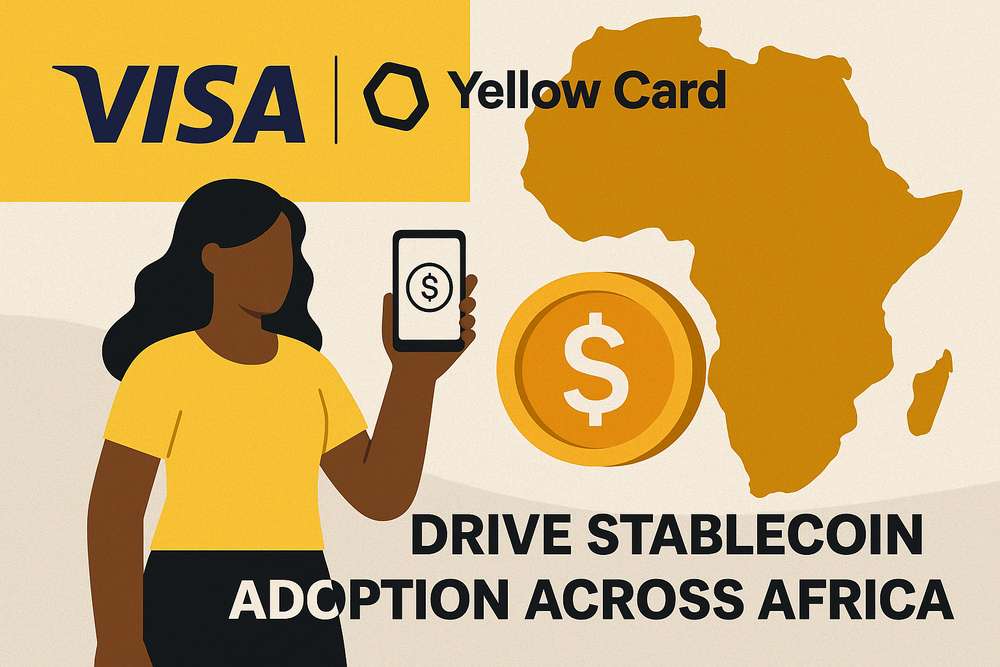Visa has partnered with African fintech agency Yellow Card to speed up stablecoin-based cross-border funds throughout Africa, marking a big step towards mainstream digital greenback adoption in rising markets. The collaboration will initially launch in at the very least one African nation in 2025 earlier than increasing all through the Central and Jap Europe, Center East, and Africa (CEMEA) area in 2026. This initiative leverages Visa’s world fee infrastructure and Yellow Card’s in depth on-ground presence throughout 20 African nations to handle longstanding remittance challenges.
The partnership allows companies to make use of stablecoins for worldwide transactions by means of Visa Direct, permitting direct transfers to financial institution accounts or playing cards. This integration goals to scale back transaction prices and processing instances whereas offering 24/7 settlement capabilities. Visa’s Godfrey Sullivan emphasised that “each establishment that strikes cash will want a stablecoin technique” by 2025, signaling the corporate’s dedication to blockchain-based options.
Yellow Card brings confirmed expertise in stablecoin operations, having beforehand built-in PayPal’s PYUSD for cross-border settlements in 2023. The fintech firm’s infrastructure already helps over $500 billion in month-to-month stablecoin remittances throughout Sub-Saharan Africa, demonstrating robust regional adoption.
Visa’s Stablecoin Infrastructure Growth
Visa is extending its stablecoin settlement capabilities to issuers and acquirers throughout the CEMEA area, enabling dollar-denominated transactions through blockchain expertise. This strategic transfer enhances present partnerships with firms like PayPal and positions Visa as a bridge between conventional finance and digital belongings. The fee big’s infrastructure will permit companies to carry dollar-pegged stablecoins whereas facilitating seamless conversions to native currencies.
The growth builds on Visa’s established stablecoin settlement answer, which processes transactions for establishments globally. Sullivan famous that Visa goals to assist companions “navigate the transformation” towards blockchain-based funds, combining the corporate’s scale with rising applied sciences. This initiative represents Visa’s most important stablecoin push in rising markets up to now.
Yellow Card’s Pan-African Fee Community
As Africa’s first licensed stablecoin funds orchestrator, Yellow Card operates regulatory-compliant infrastructure throughout 20 international locations. The corporate grew to become the continent’s pioneer in adopting PayPal’s PYUSD stablecoin final yr, processing cross-border transfers by means of PayPal’s Xoom service. Yellow Card’s present community handles substantial stablecoin volumes, significantly in Nigeria the place stablecoins like USDT dominate crypto trade exercise.
The fintech’s infrastructure has demonstrated tangible impression in markets like Ethiopia, the place stablecoin adoption drove a 180% year-over-year enhance in low-value worldwide transfers. Yellow Card’s integration with Visa Direct will allow companies to bypass conventional banking hours and excessive charges, significantly benefiting small and medium enterprises engaged in cross-border commerce.
Market Affect and Adoption Traits
Sub-Saharan Africa has emerged as a worldwide chief in stablecoin adoption, with the area receiving over $500 billion in month-to-month stablecoin remittances in accordance with current knowledge. Companies more and more use dollar-pegged tokens to hedge towards native foreign money volatility and entry world markets. The Visa-Yellow Card collaboration may speed up this development by offering institutional-grade rails for digital greenback transactions.
Business analysts observe that stablecoins deal with Africa’s distinctive monetary challenges, together with restricted banking entry and costly remittance corridors. Conventional cash transfers in Africa common 8-10% charges in comparison with blockchain-based alternate options at 1-3%. The partnership’s give attention to treasury operations and liquidity administration suggests focusing on company fee flows alongside client remittances.
Visa’s entry into Africa’s stablecoin market follows earlier strikes by firms like PayPal, which built-in PYUSD with Yellow Card in 2023. This rising institutional participation alerts maturation past speculative crypto buying and selling towards sensible monetary functions. Fee processors more and more view stablecoins as vital infrastructure for world commerce fairly than area of interest crypto belongings.
Market observers spotlight that Nigeria and Ethiopia symbolize early success tales, with companies adopting stablecoins for import funds and export proceeds. The Nigerian naira’s volatility has made dollar-pegged tokens most well-liked settlement devices for worldwide commerce. Comparable patterns are rising in Kenya and Ghana, the place companies use stablecoins to entry world suppliers.
The Visa-Yellow Card initiative aligns with broader trade actions towards tokenized real-world belongings. Main monetary establishments more and more view blockchain-based greenback devices as foundational to next-generation fee methods. This partnership demonstrates how conventional finance and crypto-native firms can collaborate to unravel rising market challenges.
Set up Coin Push cell app to get worthwhile crypto alerts. Coin Push sends well timed notifications – so that you don’t miss any main market actions.
This partnership may considerably speed up monetary inclusion throughout Africa by offering accessible greenback liquidity. Stablecoins supply unbanked populations entry factors into world commerce whereas giving companies instruments to handle foreign money danger. As extra fee giants enter the area, count on elevated regulatory readability and infrastructure improvement all through 2025-2026.
- Stablecoin
- A cryptocurrency pegged to a steady asset just like the US greenback, designed to reduce worth volatility.
- Visa Direct
- Visa’s real-time push fee platform that permits funds switch on to eligible playing cards or accounts.
- CEMEA
- Central and Jap Europe, Center East and Africa area encompassing rising markets with excessive remittance volumes.
- Cross-border funds
- Monetary transactions the place the payer and recipient are based mostly in several international locations.
- Treasury operations
- Company monetary actions involving money administration, liquidity planning, and foreign money danger mitigation.
This text is for informational functions solely and doesn’t represent monetary recommendation. Please conduct your personal analysis earlier than making any funding choices.
Be happy to “borrow” this text — simply don’t overlook to hyperlink again to the unique.


Editor-in-Chief / Coin Push Dean is a crypto fanatic based mostly in Amsterdam, the place he follows each twist and switch on the planet of cryptocurrencies and Web3.
